82 Days of Darkness: Brownites, Falasaites, and Uites Take to the Streets of Ibadan in Protest
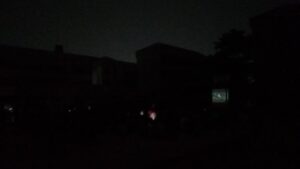
The morning air was thick with determination and bottled frustration as students and residents of Alexander Brown Hall (ABH) and Ayodele Falase Postgraduate Hall joined forces with student leaders from the University of Ibadan. Together, they marched to demand immediate intervention after enduring 82 days of power outage. This unprecedented occurrence began as quiet suffering but morphed into a united call for justice as protesters took to the streets of Ibadan on Wednesday, January 22, 2025, to make their voices heard by the general public and relevant stakeholders.
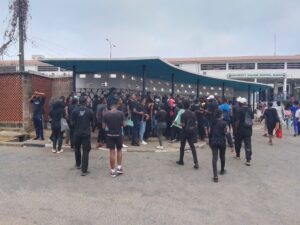
The Catalyst for the Uprising
For nearly three months, occupants of ABH and Falase Hall have endured what felt like an unending nightmare. A complete blackout that has disrupted every facet of their lives, turning what was already a demanding academic environment into an unbearable ordeal. Students now have to study for critical exams in complete darkness, and access to water has become an unattainable luxury.
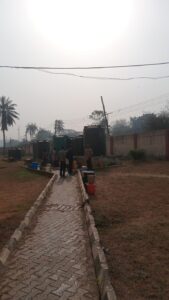
The blackout has affected everyone within the University College Hospital (UCH) environs: students, staff, patients, and business owners who rely on electricity to sustain their livelihoods. Despite numerous appeals to the UCH management, the College of Medicine at the University of Ibadan (COM-UI), the University of Ibadan administration, and even the Federal Government, no way forward has materialized.
“This isn’t just frustrating; it’s dehumanizing,” a final-year medical student lamented. “Do they know what it’s like to wake up every day knowing you won’t have light or water? We can’t keep living like refugees. We deserve better.”
For many, the blackout was the last straw that broke the camel’s back in strings of systemic neglect. The delayed action of the authorities left residents feeling abandoned, with their basic needs and dignity disregarded.
The March for Change
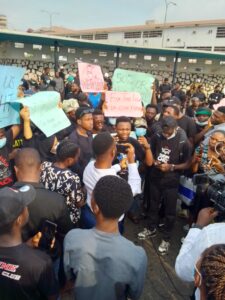
The protest commenced at approximately 7:35 a.m., with the UCH main entrance as the gathering point. The crowd quickly swelled as students and concerned citizens joined forces, united by a shared purpose: to demand their fundamental right to essential amenities.
Placards bearing bold messages such as “UCH Give Us Light,” “Fix the Light, Fix Our Future,” and “82+ Days Blackout: We Are Suffering” painted a vivid picture of the frustration felt by the community.
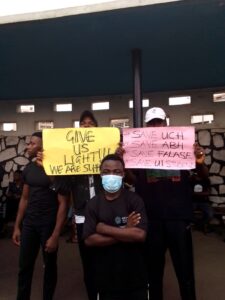
The protesters moved through key locations around UCH, including Total Garden, the State Secretariat, and the Federal Secretariat, determined to reach those in power.
Media outlets, including Channels TV and Arise TV, were on hand to capture the historic demonstration, ensuring that the plight of the protesters reached a national audience. Security personnel and police officers were also present to maintain order.
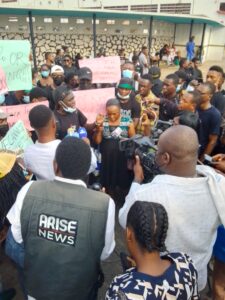
Voices from the Protest
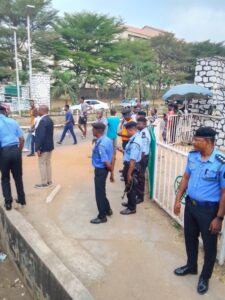
The emotions during the protest were palpable. Olamide, a 500-level medical student, articulated the collective frustration of the students:
“Because of this blackout, the educational system within UCH is very bad, medical and non-medical students are struggling in their hostels, doctors are leaving because of the hardship they’re facing, even to treat patients, many patients have died, we are contributing money among ourselves to pump water, we can’t charge, and the school does not care about us. We have tests, we have exams, we have presentations, and these things are necessary for our academic growth, yet they’re continuing the academic work without even thinking about how we’re surviving”.
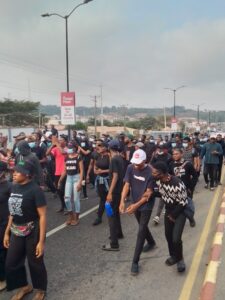
Another respondent, Babatunde, a 400-level medical student, emphasized the broader implications of the crisis: “This protest is long overdue and the fact that we’re doing it now, it’s never too late. I believe with the media coverage we’ve had since the beginning, all stakeholders will be duly informed about our mass action today. Also, I’m using this medium to sensitive the public that, they shouldn’t keep quiet and that this struggle is not just the struggle of the students. Imagine the foremost hospital in the country being in darkness for over 80 days. So, it’s something that should be declared a state of emergency. And considering that, it’s not just UCH that is affected. We have so many teaching hospitals in the country affected. We have so many tertiary institutions affected. So, we call on the Federal Government of Nigeria, we call on the minister of power, and other concerned stakeholders to swing into action, so that this problem can be solved completely. And at the same time, we call on the government and the ministry of power that, there should be immediate implementation of the 50% electricity subsidy granted to hospitals”.
His words were echoed by many others who highlighted the ripple effect of the crisis, from compromised healthcare delivery to the daily struggles of students trying to maintain academic performance in such dire conditions.

The Breaking Point
Months of silence and broken promises had led to this breaking point. The Student leaders had written formal letters, held discussions, and tried to negotiate with the UCH and UI management, all to no avail.
Doctors face immense challenges treating patients due to unstable electricity, putting countless lives at serious risk. Meanwhile, stress levels among students soared as they juggled academic pressures with the added burden of surviving without basic amenities.
“We feel abandoned,” said a final-year student. “How do they expect us to survive like this? We can’t even focus on our studies because we’re too busy worrying about light and water. This is an insult to our dignity.”
Negotiations and Promises
The protest culminated in a meeting with officials at the Federal Secretariat. Among those present were Engr. Kayode Ibrahim (Federal Controller of Works, Oyo State), Dr. Olabode Ladipo (Head of Federal Health Service, Oyo State), and Mr. Adejire Adewole Solomon (Federal Controller of Housing, Oyo State). Although the absence of the Minister of Power, Adebayo Adelabu, was a disappointment, the protesters were assured that power restoration would occur within days.
“UCH will have power restored on or before Friday, and I will personally ensure the sustainability of this resolution,” Mr. Adewole promised.
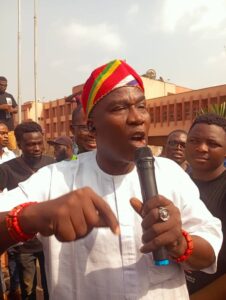
At the state level, Fatai Owoseni, the Special Adviser on Security to Governor Seyi Makinde, also pledged the governor’s intervention. While these assurances offered a glimmer of hope, many protesters remained sceptical, given the history of unfulfilled promises.
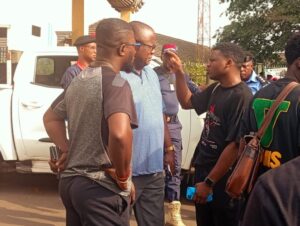
A Conditional Truce
With these promises, the protesters agreed to suspend their demonstration temporarily. However, they issued a stern warning: “if power is not restored by the promised deadline, we will return to the streets in even greater numbers”.
“This is not just about today; it’s about our future,” declared a student leader. “If nothing changes, we’ll be back on Monday, stronger and louder.”
Although the protest has ended, the spirit of resistance remains strong. The students made it clear that they would not be silenced until concrete actions were taken.

The Pain of Waiting
As days pass, the entire UCH community waits anxiously. The promises made by officials linger in the air—fragile yet filled with hope. For many, this uncertainty is agonizing. Will this finally mark the beginning of change, or will it be yet another chapter in a long history of neglect?
The silence of the blackout still booms, but so does the determination of those who refuse to be ignored. Whether this movement leads to lasting change or becomes a rallying call for something even greater, one thing is certain: the voices of these students have ignited a spark that will not be extinguished until the light is restored.
